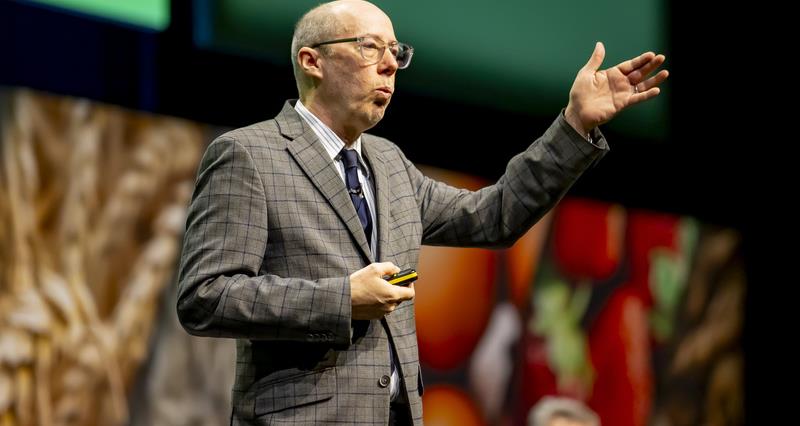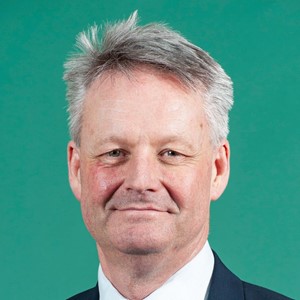Introducing Mr Bobo, NFU Vice President David Exwood said he had been pleased to hear the Prime Minister reference his “trust for farmers”.
“For too long farmers have not felt trusted and I know, and you know, that you can trust them to deliver for food and the environment,” he said.
“The NFU has always believed that it is vital to look beyond these shores and to have a global view and voice, which is why our next session is titled ‘British Food in a Global Context’.”
After 2050, the director of the Food Systems Institute at The University of Nottingham said the job of feeding the world sustainably would slowly become easier as the planet reaches “peak child” and birth rates continue to decline.
He said this critical period began in a present where agriculture felt “under attack” for its footprint.
That, he said, made communication vital (“we need people to understand the choices and consequences better”) – especially as Mr Bobo strongly refuted suggestions in some quarters that the food system is ‘broken’.

‘Food is not broken’
“If it is broken, when was it not? Was it better ten years ago, 50 years ago, 100 years ago? I don’t think so. In terms of childhood mortality, we’re at the lowest point in human history. About 10% of the people on the planet are going to bed hungry, it’s unacceptable. But 60 years ago, it was 30%.”
In fact, the former senior advisor on food policy in the US Department of State said it wasn’t a case of “things are bad and getting worse” but “things are good and getting better – but not fast enough”.
“Yes, we’re using a little bit more land for agriculture, but we’re producing dramatically, dramatically more food than we were in 1960,” he said.
Taking the global view, he said that meant that while agriculture worldwide is one of the biggest drivers of deforestation, agricultural innovation and efficiency in places like the UK was also a big reason forests still exist on their current scale.
“There are about 3.6 billion hectares of forestry on the planet, and what people forget is that, if today we were farming the way we were in 1960, we would need 1 billion additional hectares of land to produce the food we do now.
“That’s what innovation has delivered, but people don’t credit agriculture for saving 1bn hectares of forest.”
“Yes, we’re using a little bit more land for agriculture, but we’re producing dramatically, dramatically more food than we were in 1960,”
Jack Bobo
‘It’s OK if people eat veggie burgers’
Mr Bobo said FAO (Food and Agriculture Organisation) figures suggested the world would need 25% more food protein by 2050.
And, strikingly, he suggested that if ‘alternative’ proteins filled more of that gap, it might not be the worst scenario for UK livestock producers.
Demand for real meat wasn’t going to reduce any time soon, he said, but a worldwide livestock sector that expands significantly to meet protein demand would mostly benefit Latin American producers and spur further deforestation.
“If demand for meat increases by 25% and supply increases by 25%, do you think you’re going to make more money? Probably not.
“But if alternative proteins expand, that doesn’t mean you produce any less meat, it just means the Brazilians don’t produce more. So, we don’t have any deforestation and demand increases – but supply is flat. I suspect you are making more money in which demand for real meat is outpacing supply.
“In terms of the world you want to see, where you are making money and protecting the environment, it might be OK if some people want to eat veggie burgers.”
Meet the speakers from this session
Jack Bobo
Director, Food Systems Institute at the University of Nottingham
Prior to joining the Institute, Jack served as the Director of Global Food and Water Policy at The Nature Conservancy (TNC) and as the CEO of Futurity, a food foresight company.
He is the author of the 2021 book ‘Why smart people make bad food choices.’ Recognised by Scientific American as one of the 100 most influential people in biotechnology, he also served as the Chief Communications Officer and SVP for Global Policy at Intrexon Corporation and as a senior advisor for food policy at the U.S. Department of State.
A global thought leader, Jack has delivered more than 500 keynote speeches in 50 countries on the future of food. Degrees include J.D. in Law, M.S. in Environmental Science, B.S. in Biology and B.A. in Psychology and Chemistry.
David Exwood
NFU Deputy President
David farms south of Horsham in West Sussex with his wife and two sons over 1200 tenanted hectares in the heart of the Sussex Weald.
Starting in 1989 with 70ha the business now has arable, dairy beef, Sussex suckler herd and sheep enterprises. In 2003 the Farm Shop opened and sells a wide range of food from the Victorian stable yard at Westons.
He has served previously within the NFU as Branch Chair, West Sussex Council Delegate, South East Regional Chair as well as four years on Governance Board.
David was elected to the position of NFU Deputy President in February 2024.
Responsibilities
- EU and international relations
- Banking
- Biodiversity
- Food labelling
- Food safety
- Food service and hospitality
- Agricultural transition (productivity, ELMs, stability)
- Plant health
- Assurance schemes
- British Agriculture Bureau
- Health, safety and wellbeing
- Agricultural transport
- Uplands
- Tenants



